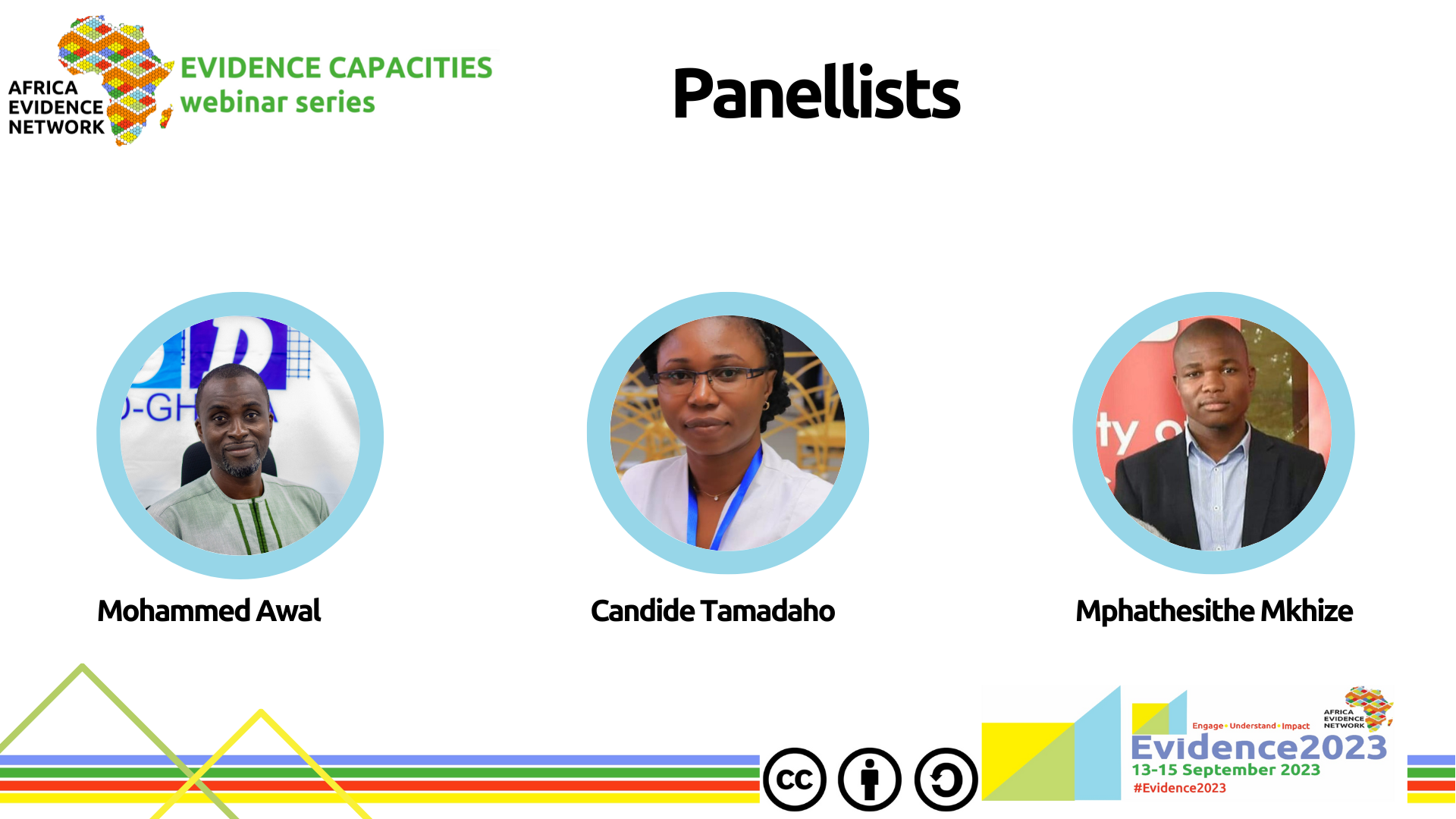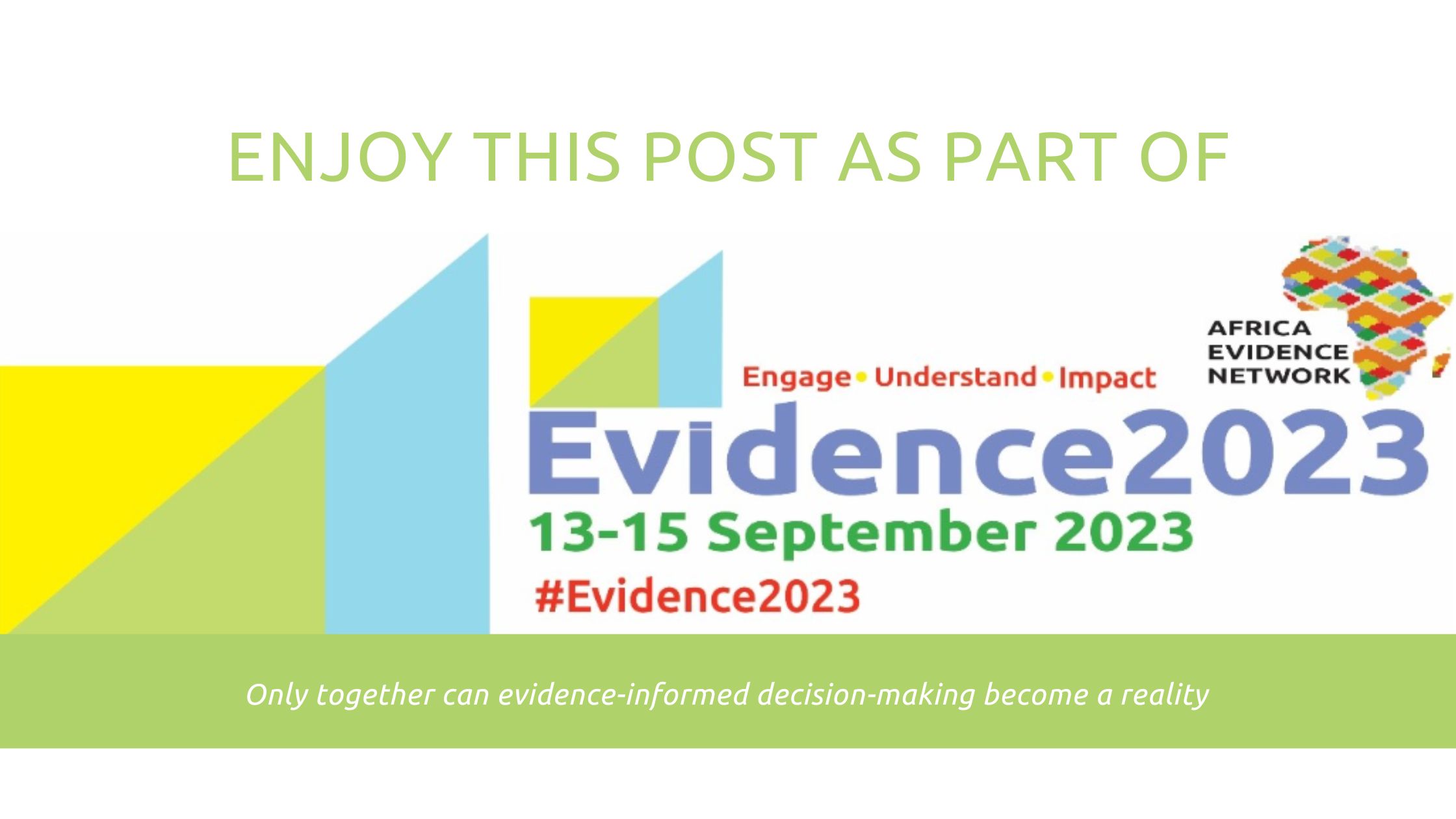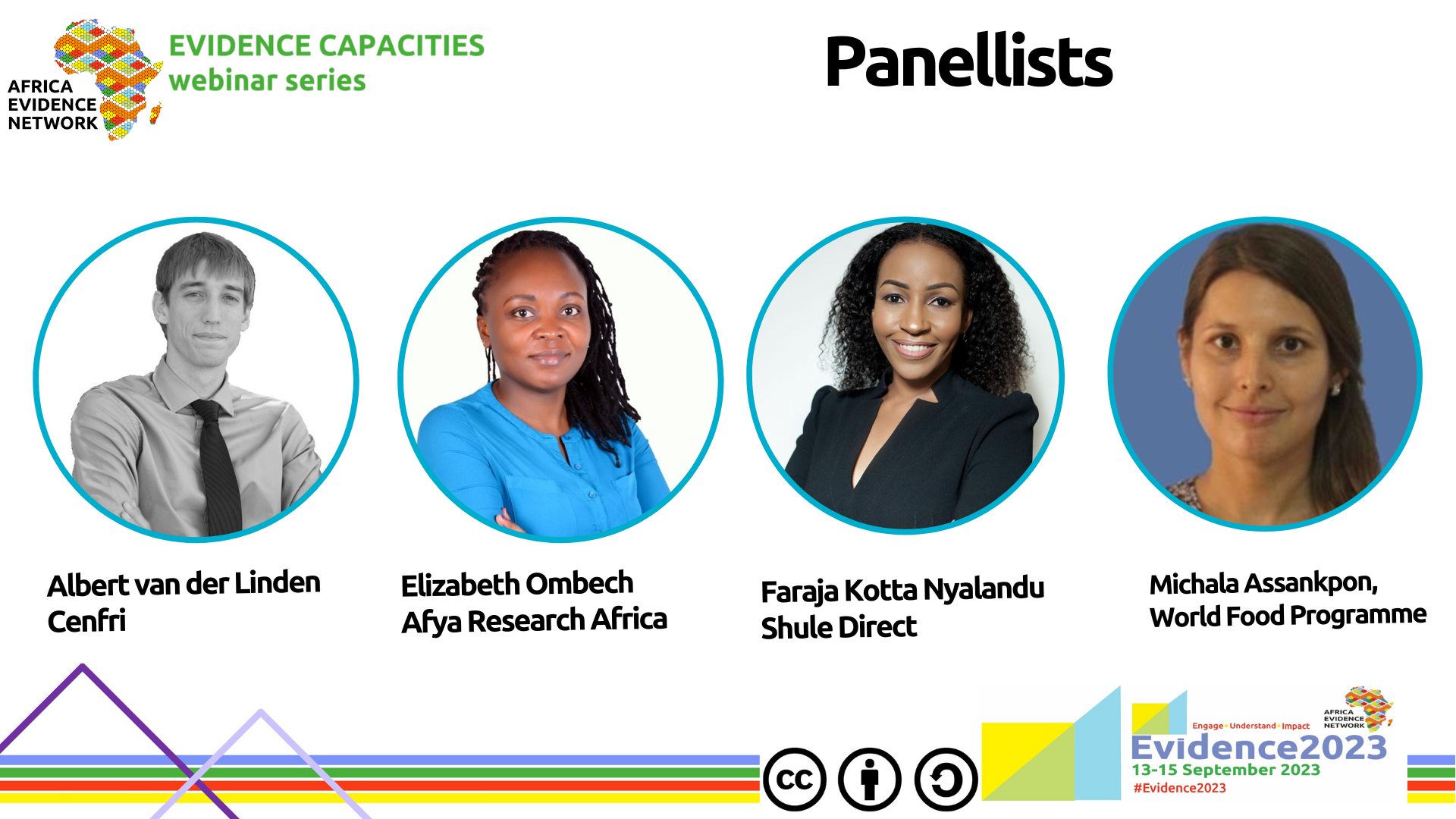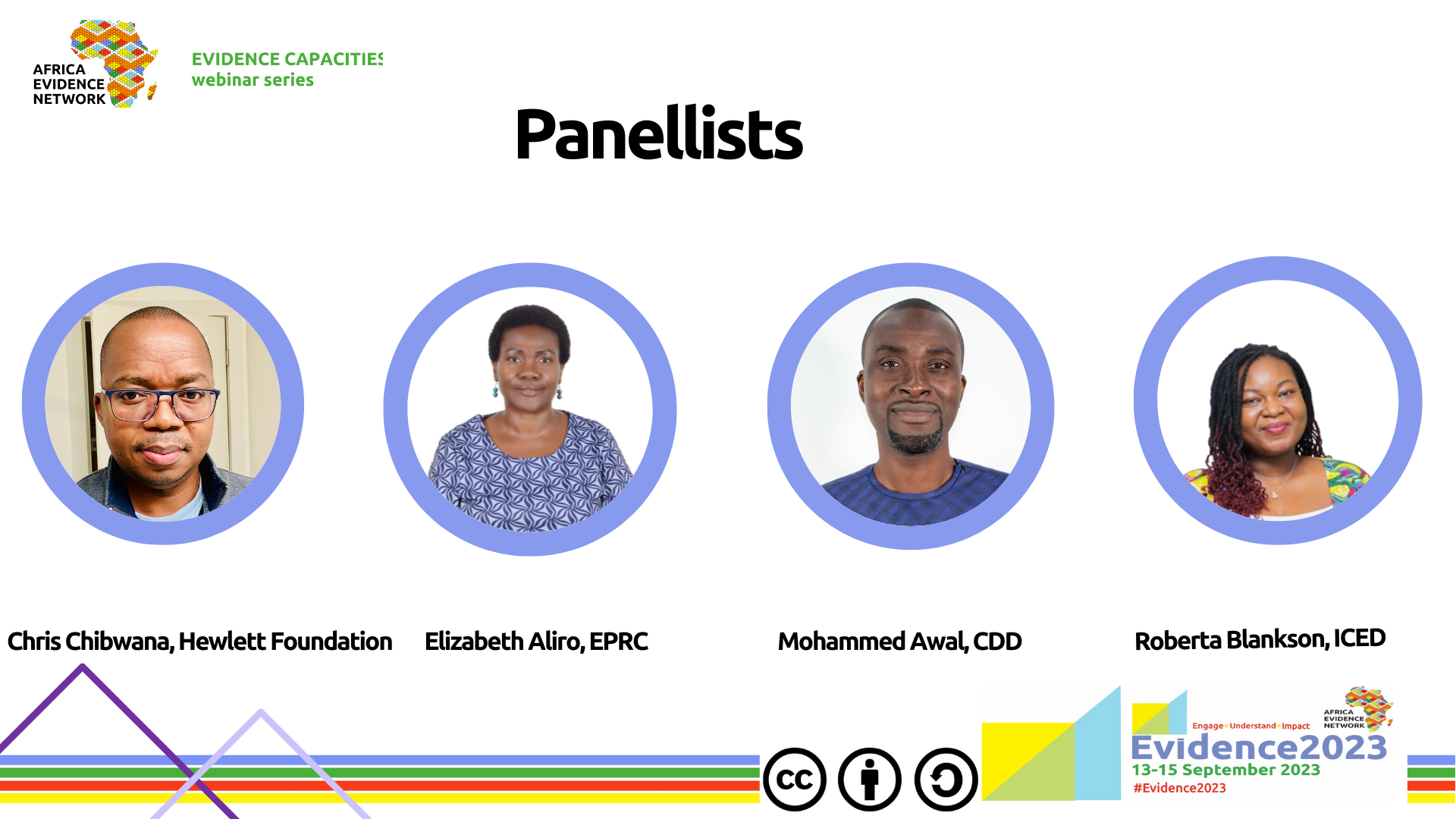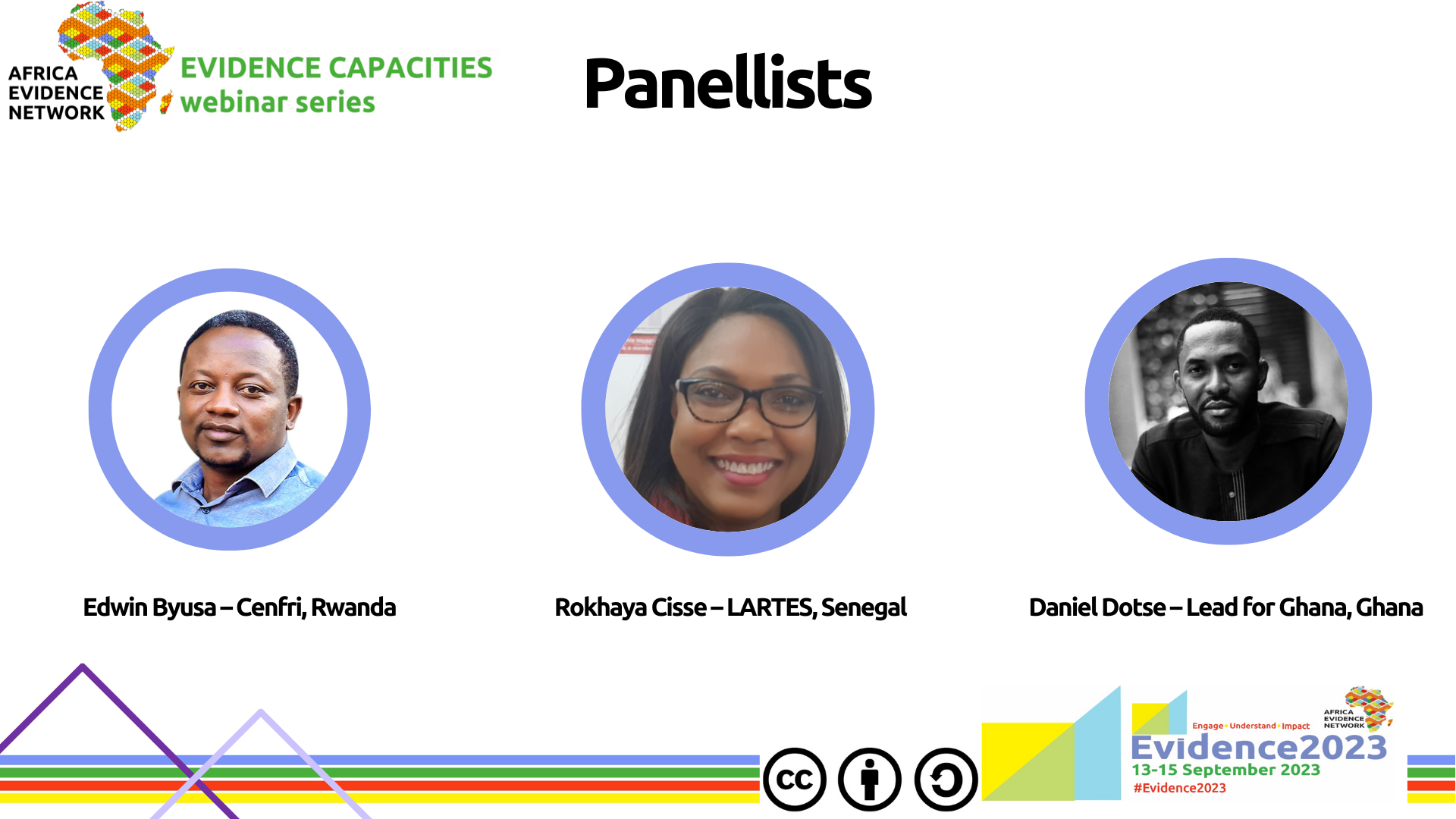
If you are interested in this topic, review the webinar presentation or watch the recorded webinar.
This blog post is based on the fourth webinar of the Evidence 2023 capacities webinar series hosted by the Africa Evidence Network (AEN). The AEN Evidence 2023 capacities webinar Series aims to create a platform for sharing experiences and ideas that push our thinking on how to enhance capacity for evidence use in Africa. The series also seeks to generate ideas on the implications of novel approaches for wider ecosystem strengthening efforts. It is also our hope that these discussions will be the basis for improving and illustrating the AEN's Manifesto on capacity development for evidence use in Africa.
Building on webinar 3, which explored innovative approaches being deployed to address structural and value issues within evidence ecosystems in Africa, this blog aims to unearth the implications of such innovative approaches among actors within evidence ecosystems of Africa. The webinar series is being held by the Enhancing Evidence Capacities Working Group as a build-up to the much-anticipated Evidence 2023 in September 2023.
Panel of speakers
Once again, this webinar session was chaired by Siziwe Ngcwabe and moderated by Kirchuffs Atengble, both co-chairs for Evidence 2023. Siziwe started the session with a few housekeeping and ground rules, gave background on the EIDM initiative, which started in 2020, and Kirchuffs introduced the session panellists. The esteemed panellists included Dr. Edwin BYUSA, PhD (Cenfri, Rwanda), Prof. Rokhaya Cisse (Laboratoire de Recherche sur les transformations economiques et sociales (lartes-ifan), Senegal), and Daniel Dotse (Lead For Ghana, Ghana).
Personal views on innovations being deployed to address structural and value issues within evidence ecosystems in Africa
In Ghana, where Daniel has been implementing various programmes in the educational sector, he highlighted that the recruitment process for personnel has an impact on the educational outcomes in classrooms. He gave an example of the huge disparity in recruitment standards and practices between big corporate companies and that of teachers by the government. Contrastingly, corporate recruitment has a lot of focus on recruiting the right people, a lot of marketing, and different interview stages to get the best candidate for the job, while the recruitment of teachers by the government has gaps, and this is likely to affect outcomes in the classroom and broadly across the country. He cited another anomaly, involving a change in the recruitment of trainee teachers in Ghana for with lowering entry qualifications, which equally have strong implications within the educational systems. To him, what has been lacking is how to capture the evidence from innovations and scaling them across multiple sectors.
Rokhaya shared her experience, stating that it is important for organisations to track, collect and use data to inform decisions. She encouraged organisations (government and other stakeholders) to use technology in this process, as they enhance knowledge sharing opportunities about innovations among stakeholders. She bemoaned however, the limited follow-up mechanisms to monitor applications of these resources among intended beneficiaries in their decision-making processes. She registered how LARTES has put together an observatory to enable interactive use of data for decision-makers and stakeholders, including also coaching mechanisms and a system to track how data is being used.
Based on his experience, Edwin observed capacity development/building is done at three levels: individual, organisational, and system levels. He elaborated that it may also take a bottom-up or top-down approach. Edwin appreciated project buy-in from the central government, which has made it easier to apply EIDM principles; because people, including in government, know the importance of evidence in decision-making. At Cenfri, they came up with trainings and a community of practice in the field of data science, working with the Rwandan government and private sector to ensure that the implementing team is able to understand changes at structural level rather than being satisfied by just ticking boxes that people have been trained. The communities of practice ensure that people trained can continue to interact, exchange, and share information and knowledge, and that they can identify gaps in time. At different levels, they are building capacity, including individual and structural levels, targeting the executive to make sure they have an appreciation of data literacy.
Implications of innovations on implementing organisations’ work
Edwin informed that at Cenfri, they had to come up with different and flexible approaches, and that organisations must be ready to adopt some unconventional methods in response to the ever-changing world. There is a need to look at and treat people as individuals with unique needs rather than using a one-size-fits-all approach.
Daniel observed that innovations are taking place in Ghana and across Africa but on a small scale. Comparing data collected with what is reported by the Education Department, they noted massive variances in classroom data, and sought to understand reasons behind the differences. He cited differences in school attendance rates between northern and southern parts of Ghana and Nigeria may be due to religious factors, as northern schools record lower attendance, particularly every Friday day of the week. As an organisation, they tailored their approach to education based on geographical, cultural, and other contextual specifications. They also observed that technology penetration and accessibility vary between rural and urban areas, with better internet connectivity in urban regions compared to rural regions.
Rokhaya shared her experience of working with LARTES on policy-making in Senegal, where they dedicated about 80% of their time to data collection. Despite the amount of time and effort spent, policy-makers were not making much use of this data. Against this background, they changed their approach to ensure they had insights into how their data was being utilised by policy-makers. They adopted the use of data ambassadors to relay the message that data is available, used social media to disseminate visuals on the data to garner interest, and informed their audience of available support to use the data. This change required more resources, like specialists in communications and statistics, who could disaggregate the data in a useful way for decision-makers. Once there was interest from decision-makers, they felt they needed specialists in knowledge management to follow up on uptake and utilisation.
Implications of innovations for other various actors in the evidence ecosystem
Rokhaya observed that some actors are quick to report or document that they have an innovation, which sometimes falls short of the real qualities of an innovation, can’t be replicated, and/or may not be sustainable. Sometimes there is no data, or the data is inadequate, and she went on to give an example of a girls’ education programme (see details in webinar recording).
Edwin highlighted a need for data sharing among actors, and he cited scenario of an actor facing data quality challenges. He proffered data sharing between government and private sector to address these kinds of challenges for instance because the private sector plays an important role in development. In addition, he advocated for open access to data, which has implications for producing academic graduates ready to enter the market for impacts.
Daniel expressed his belief in a need for strong advocacy for increased investments in the education sector, as not everyone appreciates the importance of education. As organisations generate data, there is a need to engage government and private sector on the importance of data and how these resources can propel socioeconomic development. Organisations need to build a culture of using data to make informed decisions, and this should start in the classroom, and spreading across communities. There is a need to understand the bigger picture in terms of Africa’s challenges related to data production, management, and use.
Envisaged high-end outcomes and potential impacts if ecosystem actors implement changes recommended
Edwin emphasised that ‘EIDM will happen’, and this will lead to sustainable development on the continent. He added that when policies are made based on data and evidence, we should be able to test those policies.
To Rokhaya, there will be data-driven policy-making, and the evaluation and review of policies will be anchored on good and quality evidence and data. She emphasised that policies, in that instance, will be based on evidence and scientific insights.
Questions and answers
In response to a question from the audience on any suggestions for improving the coordination of research at the national level, Daniel put forward that such venture requires proper allocation of resources, including personnel. This is because, with the right data, programmers will know what kind of resources and personnel are required during policy design. These steps and measures will cut a lot of unnecessary costs and save resources. Having data will ensure that there are data-driven policies and evidence-driven implementation, which can show what is working and what is not. He argued with the adage that "education is the silver-bullet for all societal problems".
Conclusion
The moderator wrapped up the session by emphasising that if the recommendations coming from the panellists are taken on board by various actors in the evidence ecosystem and utilised, then there will be sustained use of evidence, translating into quality services that are delivered across sectors, finally translating into the welfare of citizens. He emphasised that this is what the Africa Evidence Network is all about!
About the author: Enock Musungwini is a programme manager (consultant) for an NGO called Pangaea Zimbabwe under the Wild4Life Health program and is also an independent health and management consultant. He has over 18 years of cumulative experience in health, covering various thematic areas including health financing, primary healthcare, health insurance, health regulation and compliance, sexual and reproductive health, health research, and health policy. He holds an MSc in Public Health degree with a research award from the London School of Hygiene and Tropical Medicine (LSHTM), a Master’s in Business Administration degree, a BSc Hons Psychology degree, a Diploma in Nursing Science, and many other qualifications. Enock serves on various committees at the regional and international level, including being a reference group committee member for the Africa Evidence Network (AEN), a steering committee member for the International Network for Government Science Advice Africa chapter, a country representative for Healthcare Information for All (HIFA), and an alumni ambassador for LSHTM. Enock received many awards, including the Brand Ambassador and Growth and Innovation award from Pangaea Zimbabwe (June 2023), Country Representative of the Year by HIFA (April 2023), Chevening volunteers’ gold award by the British Foreign and Commonwealth Office (June 2019), Zimbabwe Achievers Chairman’s award (Nov 2019), the Amanda Jacklyn Berger prize for the MSc Research project by LSHTM (Feb 2020), and the Marie Stopes International Clinics Champion award (Jan 2017). He has presented various papers and abstracts at national, regional, and international conferences and has written many blogs and opinion pieces on various public health and related topics. He may be reached via email at emusungwini@yahoo.co.uk. His social media contacts are on Twitter, LinkedIn, and Facebook.
Acknowledgements: The author(s) is solely responsible for the content of this article, including all errors or omissions; acknowledgements do not imply endorsement of the content. The author is grateful to Charity Chisoro and Kirchuffs Atengble for their guidance in the preparation and finalisation of this article as well as their editorial support.
Disclaimer: The views expressed in published blog posts, as well as any errors or omissions, are the sole responsibility of the author/s and do not represent the views of the Africa Evidence Network, its secretariat, advisory or reference groups, or its funders; nor does it imply endorsement by the afore-mentioned parties.
Suggested citation: Musungwini, E. (2023) Capacity development for EIDM in Africa: implications of targeting structural and value issues for ecosystem actors. Blog posting on 07 September 2023 that is part of the AEN blog series on the Evidence 2023 Capacities webinar series. Available at: https://www.africaevidencenetwork.org/en/learning-space/article/310/
